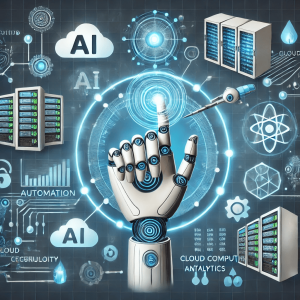Introduction
The integration of Artificial Intelligence (AI) into the IT industry is changing the landscape. In this article, we’ll show you how AI is changing IT industry and the fundamental ways it is reshaping the field, streamlining processes, and enhancing decision-making. AI has introduced new capabilities in areas such as automation, cybersecurity, and data analysis, fundamentally changing the landscape of IT. In this comprehensive guide, we will explore how AI is changing the IT industry, discussing the most impactful applications, benefits, and future trends that are reshaping the industry.
1. AI-Powered Automation in IT
AI-driven automation is changing the way IT teams handle routine tasks, allowing organizations to save time and resources.
How AI is Changing IT Automation:
- Task Automation: AI can automate repetitive tasks such as software updates, server monitoring, and network management, reducing the workload on IT staff.
- Smart Troubleshooting: AI tools can automatically detect, diagnose, and fix issues in real-time, minimizing downtime and improving system performance.
Example of AI in IT Automation:
- Microsoft Azure Automation: A platform that uses AI to manage routine IT tasks, from managing updates to automating workflows, enabling IT professionals to focus on higher-level responsibilities.
2. AI Enhances Cybersecurity in the IT Industry
One of the key areas in how AI is changing the IT industry is through cybersecurity. AI-powered tools are essential in safeguarding IT infrastructures.
How AI is Transforming Cybersecurity:
- Threat Detection and Response: AI can detect abnormal network behaviour and predict potential threats before they escalate. Tools like AI-based firewalls and machine learning algorithms are making IT environments more secure.
- Automated Incident Response: AI systems can analyze data patterns to recognize threats and immediately take action, such as isolating compromised systems or blocking suspicious IP addresses.
Example of AI in Cybersecurity:
- IBM’s Watson for Cybersecurity: Uses AI to identify vulnerabilities in IT networks, providing faster detection and response times for potential threats.
3. AI and Data Management in IT
AI’s ability to analyze large volumes of data is revolutionizing data management in the IT industry. It allows organizations to gain deeper insights and improve their data-handling strategies.
AI’s Impact on Data Management:
- Data Analytics: AI-powered tools can process and analyze massive datasets, providing actionable insights for businesses. This helps IT teams manage databases more effectively, enabling predictive analytics and proactive decision-making.
- Data Security: AI can detect vulnerabilities in data management systems and recommend actions to strengthen security protocols.
Example of AI in Data Management:
- Splunk: A platform that leverages AI to help organizations monitor, search, and analyze machine data, offering advanced analytics and operational intelligence.
4. AI in IT Infrastructure Management
Managing IT infrastructure is becoming more efficient with AI-driven solutions that can predict issues and optimize system performance.
How AI is Changing IT Infrastructure:
- Predictive Maintenance: AI can monitor IT infrastructure in real time and predict when hardware failures might occur, helping companies avoid costly downtime.
- Capacity Planning: AI algorithms analyze usage patterns and recommend optimal hardware configurations to ensure that IT systems operate at peak efficiency.
Example of AI in Infrastructure Management:
- Google Cloud’s AI-Driven Infrastructure: Uses machine learning algorithms to automatically allocate resources, balance workloads, and optimize infrastructure performance.
5. AI in Software Development and Testing
Software development is benefiting greatly from AI’s capabilities, especially in testing and coding assistance.
AI’s Role in Software Development:
- Code Generation: AI tools like GitHub Copilot help developers by suggesting code snippets, automating mundane coding tasks, and reducing development time.
- Automated Testing: AI can automatically generate test cases and run tests to ensure the software meets quality standards, reducing human errors in manual testing.
Example of AI in Software Testing:
- Testim: An AI-powered tool that helps with automated software testing, ensuring quick feedback and more accurate results during the development process.
6. AI’s Impact on IT Support and Help Desks
Another example of how AI is changing IT industry is the transformation of IT support and help desks. AI-powered tools provide real-time responses
How AI is Changing IT Support:
- Chatbots and Virtual Assistants: AI-powered chatbots handle common IT support queries, providing 24/7 support and freeing up IT staff for more complex tasks.
- AI-Driven Knowledge Bases: AI can help IT support teams by pulling information from vast knowledge databases, offering fast and accurate solutions to customer issues.
Example of AI in IT Support:
- ServiceNow’s Virtual Agent: Uses AI to provide automated support for routine IT issues, helping reduce response times and improve customer satisfaction.
7. AI in Cloud Computing and IT Infrastructure
Cloud services are using AI to optimize resource allocation, reduce latency, and ensure network security.
AI’s Role in Cloud Computing:
- Resource Optimization: AI algorithms ensure that cloud resources are allocated efficiently, reducing costs and improving performance.
- Automated Scaling: AI tools automatically scale resources up or down based on real-time demand, ensuring smooth operations during traffic spikes.
Example of AI in Cloud Services:
- Amazon Web Services (AWS): AWS uses AI to optimize cloud infrastructure, offering scalable services that adapt to business needs in real time.

Conclusion
The integration of AI into the IT industry is driving significant changes across multiple areas, from automation and cybersecurity to data management and IT support. AI-powered tools are streamlining IT operations, improving efficiency, and providing advanced security measures to protect against emerging threats. As AI continues to evolve, its impact on the IT industry will only grow, making it an essential component of any modern IT strategy


